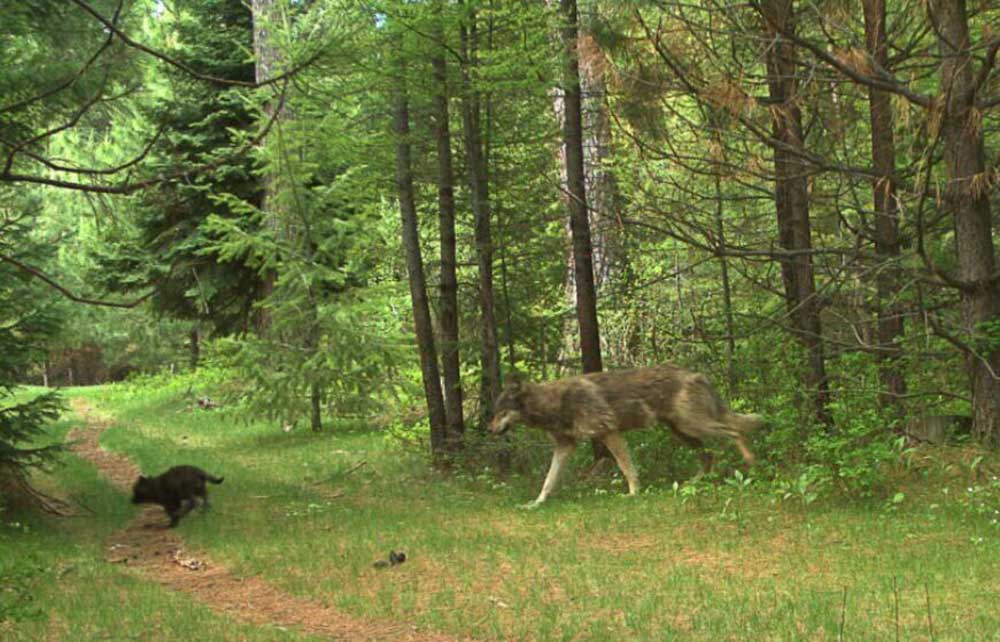Member of Baker County’s wolf depredation compensation committee resigns
Published 3:00 pm Tuesday, February 27, 2024

- Two members of the Catherine wolf pack on private property in eastern Union County in May 2017.
BAKER CITY — Tom Van Diepen doesn’t want to eradicate wolves from Baker County.
Trending
But he does want to change how the predators are managed so they’re less likely to kill cattle, sheep and working dogs.
Van Diepen, a longtime insurance agent in Baker City, contends that Oregon’s current wolf strategy is neither fairly compensating ranchers for the loss of livestock and other costs resulting from wolves, nor protecting wolves.
Van Diepen had experience in the first topic as a member for the past few years of Baker County’s seven-member Wolf Depredation Compensation Committee.
Trending
He resigned his position on the committee Jan. 31.
In a letter to county commissioners announcing his resignation, Van Diepen wrote that “I believe as a county we should not be involved in administering the (state) wolf plan. It is ineffective, inefficient and costly. We have been, in effect, enabling poor policy by cooperating with the state.”
Van Diepen, who was appointed by commissioners to the committee as a representative of the business community, said he has had concerns about wolf management, including the compensation program, for a couple years.
He said he concluded that program, and wolf management overall, is an “inefficient, nonworkable solution for the wolves and the producers.”
Van Diepen noted that the program doesn’t fully compensate ranchers for their losses and costs, either because there isn’t sufficient evidence that wolves were responsible, or because the Legislature didn’t allocate enough money to cover all applications.
In 2021, for instance, Baker County requested $45,000 to help ranchers prevent wolf attacks, but the state awarded $13,500.
Rancher advocacy groups have asked the Legislature to increase the compensation program budget.
Van Diepen also notes that although the state helps ranchers pay for nonlethal methods, such as hiring people to monitor cattle herds and installing fencing designed to deter wolves, attacks continue, some of which lead to the state killing wolves that repeatedly kill or wound livestock.
As a member of the county’s compensation committee, which meets annually to review applications from ranchers both for the loss of animals and for nonlethal tactics, Van Diepen said he gradually came to feel he was “complicit” in supporting a system he believes doesn’t benefit ranchers or wolves.
He said his ultimate goal is to reduce wolf attacks on livestock to a level at which a compensation program is not needed.
To achieve that, Van Diepen would prefer that ranchers be allowed to deal with wolves on their own, as needed to protect their animals.
He recognizes that such a policy would not be popular among people who want Oregon’s wolf population to grow from the 178 animals that the Department of Fish and Wildlife said was the minimum number as of the end of 2022.
(State officials say that annual count is a minimum, and that there are more wolves in Oregon. The annual wolf report, which will include the minimum population count as of the end of 2023, will be released this spring.)
One of Van Diepen’s alternative suggestions is to let ODFW manage wolves as the agency does with other predators such as bears and cougars.
That could include allowing limited hunting of wolves. Van Diepen said it seems to him more sensible to have hunters pay for the privilege of hunting wolves rather than spending tax dollars, as Oregon does now, to have state employees kill wolves that are chronic killers of livestock.
A third option, Van Diepen said, is to have Baker County create its own wolf management plan, including ways to control wolf numbers to minimize attacks on livestock.
As with the first option, he acknowledges that delegating to an individual county the authority to manage wolves — and potentially to kill them — would be a political challenge.
Any of the options would require legislative action, Van Diepen said.
In any case, he said he’s not advocating for eliminating wolves from Oregon, as they were for about half a century before they started migrating into the state from Idaho in 1999.
(Oregon has never released wolves in the state.)
Van Diepen is a big game hunter who has heard wolves howling in Montana and found their tracks in snow, although he’s never seen a wolf in the wild.
“I’ve always liked hunting in places with wolves,” he said. “I like the idea of having all kinds of wildlife out there.”
Van Diepen said he wants Oregon’s wolves to roam in wilderness areas and other places where they’re less likely to attack livestock.









